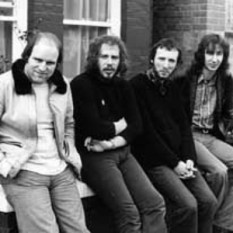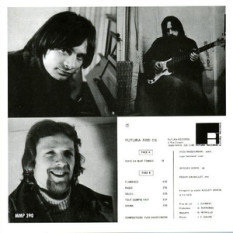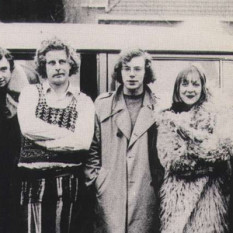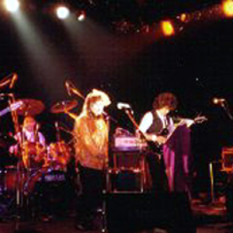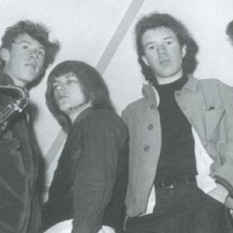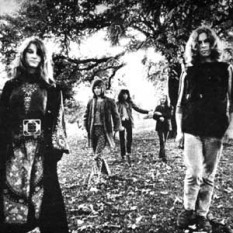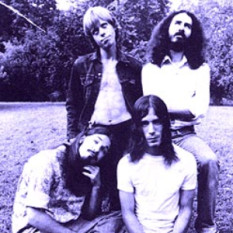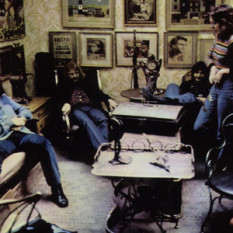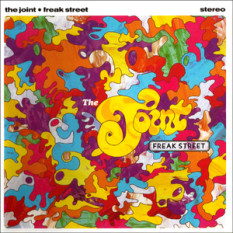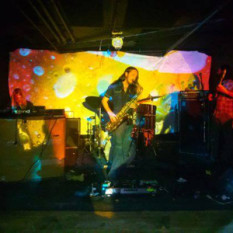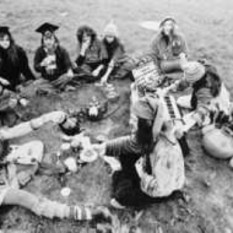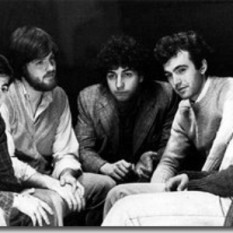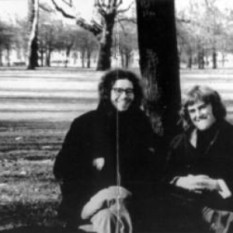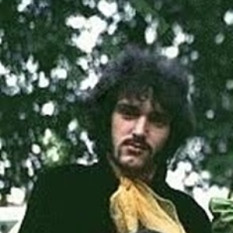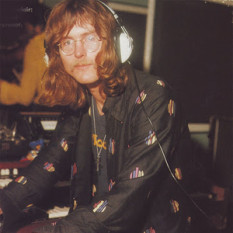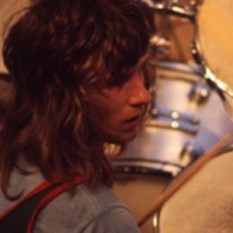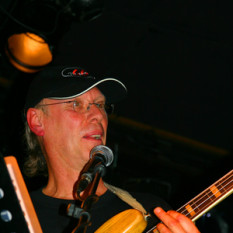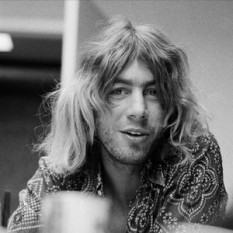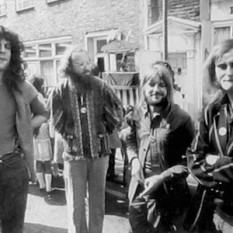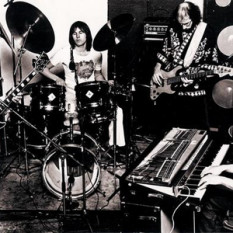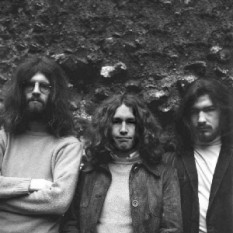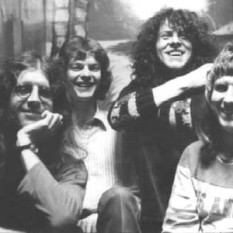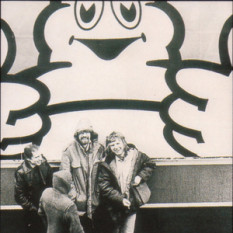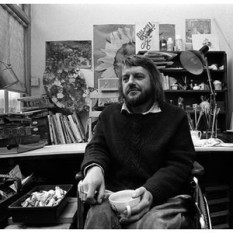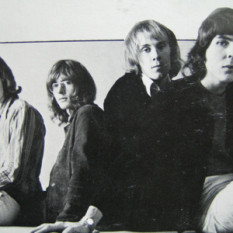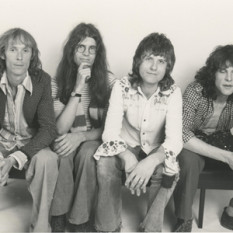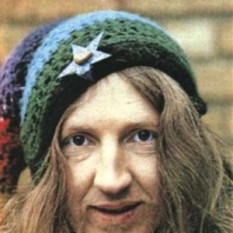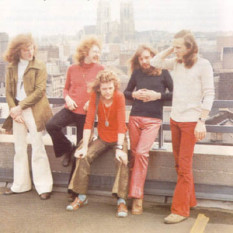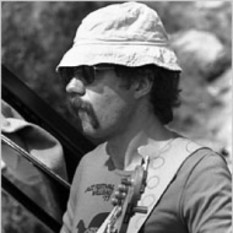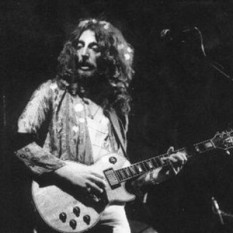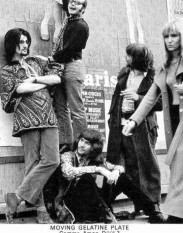The Canterbury scene (or Canterbury sound) is a term used to loosely describe the group of progressive rock, avant-garde and jazz musicians, many of whom were based around the city of Canterbury, Kent, England during the late 1960s and early 1970s. Many prominent British avant-garde or fusion musicians began their career in Canterbury bands, such as Hugh Hopper, Steve Hillage, Dave Stewart, Robert Wyatt, Kevin Ayers, Daevid Allen, Mike Ratledge, Fred Frith, and Peter Blegvad.[1][2] Over the years, with band membership changes and new bands evolving, the term has been used to describe a musical style or subgenre, rather than a regional group of musicians.
The Canterbury scene is largely defined by a set of musicians and bands with intertwined memberships. These are not tied by very strong musical similarities, but a certain whimsicalness, touches of psychedelia, rather abstruse lyrics, and a use of improvisation derived from jazz are common elements in their work.[1] “The real essence of 'Canterbury Sound' is the tension between complicated harmonies, extended improvisations, and the sincere desire to write catchy pop songs.” “In the very best Canterbury music...the musically silly and the musically serious are juxtaposed in an amusing and endearing way.” [3]
There is variation within the scene, for example from pop/rock like early Soft Machine and much Caravan to avant-garde composed pieces as with early National Health to improvised jazz as with later Soft Machine or In Cahoots. Didier Malherbe (of Gong) has defined the scene as having "certain chord changes, in particular the use of minor second chords, certain harmonic combinations, and a great clarity in the aesthetics, and a way of improvising that is very different from what is done in jazz."[
The scene had one main root in the Wilde Flowers, a band formed in 1964 which, at various times, was home to most of the founding musicians of both the Soft Machine and Caravan, bands which in turn provided the musicians of several later bands. The genesis of the Canterbury Sound may, in part, be traced back to 1960, when Australian beatnik Daevid Allen lodged at Robert Wyatt's parents' guest-house in Lydden, ten miles to the south of Canterbury. Allen brought with him an extensive collection of jazz records, a different lifestyle, and the jazz drummer George Niedorf who later taught Wyatt the drums. In 1963, Wyatt, Allen and Hugh Hopper formed the Daevid Allen Trio (in London) which metamorphosised into the Wilde Flowers when Allen left for France. Wyatt, Allen, Kevin Ayers (from the Wilde Flowers) and Mike Ratledge (who had played on occasion with the Daevid Allen Trio) formed Soft Machine in 1966.
Other key early bands were Delivery and Egg, whose members blended into the Canterbury scene in the early 1970s. For example, Phil Miller of Delivery went on to found Matching Mole and Hatfield and the North, the latter with Dave Stewart of Egg. Both were later in National Health, while Steve Hillage, who dropped out of a degree course at the University of Kent at Canterbury, had worked with the members of Egg in a previous band, Uriel, was later in Gong with Allen.
The Canterbury scene is known for having a set of musicians who often rotated into different Canterbury bands. Richard Sinclair, for example, was at different points of his career, in the Wilde Flowers, Camel, Caravan, Hatfield and the North and, briefly, Gilgamesh; he also worked with National Health. His cousin Dave Sinclair was in Caravan, Camel, Matching Mole and, briefly, Hatfield and the North. Robert Wyatt was a member of the Wilde Flowers, Soft Machine, Matching Mole, and also did work as a solo artist. Pip Pyle was in Delivery, Gong, Hatfield and the North, National Health, Soft Heap and In Cahoots. Hugh Hopper was in Soft Machine, Isotope, Stomu Yamash'Ta's band, Soft Heap, In Cahoots and, with Pyle and Allen, Brainville, Hughscore, as well as doing numerous of his own group and solo projects and working with non-Canterbury bands such as Bone.
Other individuals peripheral to the scene but with connections include Mike Oldfield (who played in Kevin Ayers' band), Bill Bruford (briefly drummed in Gong and National Health and employed Dave Stewart in his late 1970s band, Bruford), Allan Holdsworth (who worked with Soft Machine, Gong in their jazz rock period, and the band, Bruford), and Andy Summers (who was briefly a member of Soft Machine, and also worked separately with Kevin Ayers). Similarities to the Canterbury sound are also present among Canadian progressive rock acts of the mid-70's, particularly Opus 5, Sloche and Harmonium.
Bands:
Five bands that were central to the Canterbury scene
-----------------------------------------------------------------------
Soft Machine
Caravan
Gong
Hatfield and the North
National Health
Other notable bands in the Canterbury scene
-------------------------------------------------------------
Camel
Caravan of Dreams
Comus
Delivery
Egg
Gilgamesh
Henry Cow
In Cahoots
Isotope
Khan
Matching Mole
Mashu
Mirage
The Polite Force
Quiet Sun
Soft Heap
Short Wave
The Wilde Flowers
.

